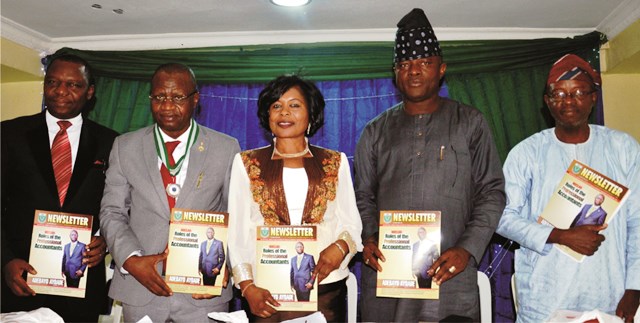Ict/Telecom
‘Four Billion People ’ll Be Connected To Internet By 2020’

By 2020, about four billion of the world’s 7.6 billion population would be connected leveraging on advancement in Internet of Things (IoT), according to EcoStruxure, a platform of Schneider Electric.
The company’s Marketing Communication Manager, Mrs. Viviane Mike-Eze said 30 billion things including businesses and organisations will also be connected, and that the whole essence was to enhance safety, reliability, efficiency and sustainability.
She disclosed this to newsmen on the sidelines of an IDC Data Centre Roadshow in Lagos, on Monday.
She said the data centre industry was undergoing profound transformation to support the enormous data volumes and processing demands being generated by IoT.
“This is a strong opportunity for growth in the industry as we need to provide solutions that are able to address this challenge.
“It is specifically relevant for us here in Nigeria now with data residency regulations about to be enforced,” she said.
EcoStruxure, she said, would leverage advancements in IoT mobility, sensing, cloud, analytics and cyber security to ensure innovations and connectivity in organisations.
The Tide source reports that the Internet of Things is the network of physical devices, vehicles, home appliances, and other items embedded with electronics, software, sensors, actuators and connectivity.
It enables these items connect and exchange data, creating opportunities for more direct integration of the physical world into computer-based systems, resulting in efficiency improvements, economic benefits and reduced human exertions.
According to Mike-Eze, to succeed in the industry, businesses have to accelerate their time to market in the design, build phases and reach operational excellence for customer satisfaction.
“They will expand their businesses and keep up with fast growing market; all while reducing energy cost and improving sustainability.
“EcoStruxure architecture has a strong role to play in assisting organisations to address these challenges by leveraging connected products, edge control and analytics to optimise asset performance and drive profitability,” Mike-Eze added.
She disclosed that Google was leveraging its 21st Century Technologies empowerment scheme to establish Google Station and City WiFi in Nigeria.
“21st Century Technologies is a very strong player coming up in the market, the first Nigerian company to set up a Tier 4 design data centre, and it is set to be the biggest on the African continent.
“All the equipment in 21st Century Technologies, from the data management facility to the building management system; their alternative power solutions — all of these are Schneider Electric EcoStruxure Solutions,” said Mike-Eze.
The Tide source also reports that EcoStruxure technology is creating the path for the digital transformation of industries in Nigeria.
Ict/Telecom
Technology, Others Responsible For Nigeria’s Bonga Oil Operations
The Managing Director, Shell Nigeria Exploration and Company Limited (SNEPCo), Elohor Aiboni, said Bonga, Nigeria’s first deep-water asset, has recorded major milestones, due to effective leadership, cutting-edge technology, continuous improvement and collaboration with stakeholders.
She noted that since coming on stream in November 2005, Bonga has maintained a track record of production that saw it achieve one-billion-barrel export on February 13, last year.
In her presentation, titled “The Bonga Journey to a Billion Barrels”, at the ongoing 2024 Offshore Technology Conference in Houston, Texas, United States, Aiboni, said: “SNEPCo is grateful for the contributions of all the parties to the Bonga story and we can all be proud of the milestones.
“Bonga has been consistent. In 2014, nine years after coming onstream, it achieved half a billion barrels of crude and doubled it in 2023. We have worked relentlessly to ensure excellent asset management, project and wells delivery and deployment of technology and innovations in our operations”.
According to her, these factors, “coupled with the supportive partnership of the Nigerian National Petroleum Company Limited and our co-venturers – TotalEnergies, EP Nigeria Limited; Nigerian Agip Exploration; and Esso Exploration and Production Nigeria Limited, make Bonga stand out as a world-class investment case”.
She continued that, “SNEPCo also enjoyed the support of the Nigerian Upstream Petroleum Regulatory Commission (NUPRC) and the Nigerian Content Development and Monitoring Board (NCDMB) in the success of Bonga operations”.
Aiboni also listed the challenges of keeping the Bonga Floating Production, Storage and Offloading vessel full as the asset ages and dealing with unexpected developments with subsea wells and equipment.
She said: “SNEPCo responded with a campaign of operational excellence, which among other initiatives, led to the creation of a programme known as the Bonga Business Improvement Plan that continually reviews and identifies improvement initiatives and drives sustainability in operations and upskilling of staff.
“The Bonga success story has been led by Nigerians who have been managing directors of SNEPCo since it was established in 1993, in a deliberate policy by Shell to develop indigenous manpower for deep-water operations in Nigeria.
“Today, some 97percent of the SNEPCo workforce is Nigerian and overall, Bonga has helped to create a new generation of Nigerian deep-water professionals.
“Our vision at SNEPCo remains to be the best deep-water business, powering growth and achieving net zero emissions in line with Shell’s Powering Progress strategy”.
Ict/Telecom
Banks Cut Borrowing From CBN By 44%
Banks’ borrowings from the Central Bank of Nigeria (CBN) fell month-on-month, (MoM) by 44 percent to N12.16 trillion in April from N21.7 trillion in March.
Analysis of latest data from the CBN shows that the 44percent drop represents the first MoM decline in banks borrowing from since January when it increased by 268.7 percent to N3.6 trillion from N976.29 billion in December 2023.
However, further analysis showed that banks’ deposits in the CBN SDF grew MoM by 118.4 percent to N428.97 billion in April from N196.37 billion in March 2024.
Banks make use of the SLF to access liquidity to run their day-to-day business operations while the Standing Deposit Facility window (SDF) on the other hand, is an overnight deposit facility that allows banks to lodge excess liquidity (money) with the CBN and earn interest.
The decline in banks’ borrowing from SLF may reflect an increase in banking system liquidity and also the decision of the apex bank last year to remove the limit on the remunerable daily placements by banks at the SDF.
According to the CBN Governor, Mr. Olayemi Cardoso, the CBN removed the cap on the remunerable SDF to increase activity in the SDF window and manage liquidity.
Ict/Telecom
Expert Highlights Technology Impact On Fintech Industry Growth
A Financial technology expert, Olatunji Akinrinola, has highlighted the exponential growth of the FinTech industry, which according to him, was driven by technological advancements.
Akinrinola made this assertion in a press release recently, where he stressed that the role of technology in driving this exponential growth in the FinTech sector was very outstanding.
According to him, Technology has revolutionised the way financial services are delivered, making them more accessible, efficient, and inclusive.
“Through innovations such as mobile banking, digital payments, and blockchain technology, FinTech companies have been able to reach a larger population and provided them with access to financial services”, he stated.
Akinrinola emphasised the role of technology in enabling financial inclusion, adding: “Technology has democratised access to financial services, particularly in regions with limited banking infrastructure.
“Mobile money platforms and digital wallets have empowered individuals to conduct financial transactions conveniently and securely, without the need for traditional banking services”.
He also underscored the role of Artificial Intelligence (AI) and data analytics in driving innovation within the FinTech industry, noting: “AI-powered algorithms and predictive analytics have revolutionised risk assessment, fraud detection, and customer personalisation in financial services.
“These technologies enable FinTech companies to provide tailored solutions and mitigate risks more effectively, ultimately enhancing the overall customer experience”.
Akinrinola stressed the importance of regulatory frameworks in fostering the growth of the FinTech industry.
“While technology has accelerated the growth of FinTech, it is essential to establish robust regulatory frameworks to ensure consumer protection and maintain market stability. Regulators play a crucial role in balancing innovation with risk management, thereby creating a conducive environment for the sustainable growth of the FinTech sector”, he stated.
Akinrinola underscored the role of technology in driving the exponential growth of the FinTech industry, saying, “Technology has been a game-changer for the FinTech sector, enabling innovation, expanding access to financial services, and driving economic growth.
“As technology continues to evolve, the FinTech industry will undoubtedly play a significant role in shaping the future of financial services ecosystem”.
Corlins Walter
-
Rivers5 days ago
LG Boss Targets Education Reforms, Others
-

 Politics4 days ago
Politics4 days agoKano Gov Approves N15.6bn To Settle Ex-APC Councillors’ Entitlements
-
Sports4 days ago
UCL: Henry Calls For Return Of Away Goals Rule
-
News4 days ago
UK-Nigeria Partnership Strengthened To Combat Fraud
-
Politics4 days ago
2027: Diri Threatens To Sack Appointees Who Jump INEC’s Whistle
-

 News4 days ago
News4 days agoNDDC Seeks UN’s Support To Accelerate Niger Delta Development
-
Rivers5 days ago
Ibas Preaches Peace In Emohua
-

 Nation4 days ago
Nation4 days agoTinubu To Unveil Cotton Factory In Ogun – Abiodun

